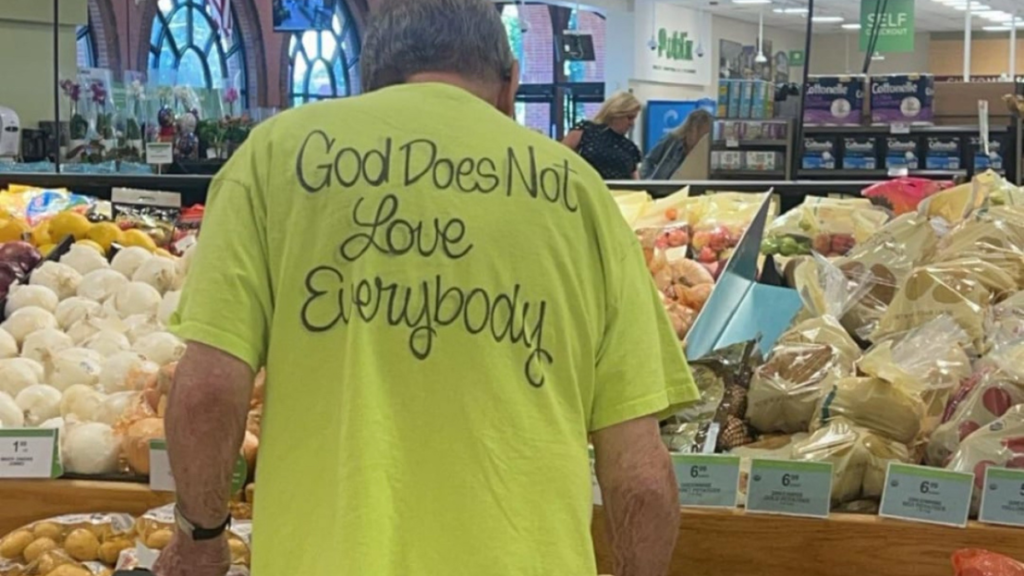
The image above is a real photo from the internet, taken in a Publix supermarket (a grocery chain in the south). I do not know this man, but his shirt is perhaps a reflection of how bad our ability to dialogue really has become in our country, so much so that it has poisoned our theology. I meant for it to be bothersome and to get your attention. The impulse to walk around in a shirt that says “God does not love everybody” may be about the fact that if God loves me, then I have to love everyone too. I have to treat them with dignity and respect. We all belong to each other because we have all been called beloved by God. Since I don’t want to love them, I am going to convince myself that God doesn’t either. Wow.
When I was 19 years old, I got a summer job with an environmental advocacy group – Illinois Public Interest Research Group (I-PIRG) – going door to door to talk with people about the Clean Water Act. I have always been told that I am chatty, personable, approachable and it’s definitely true that I love to connect with people, so this seemed like a good job for me. Who doesn’t want protected clean water? Right?
It was hard. At the start of the summer, I was my usual relentlessly hopeful and willing self…but a few weeks in I was weary of one “empty” home after another, conversations that seemed mutual but ended with “thanks, but no thanks”, outright hostility and judgment, or just amorphous fear and guardedness. I did not understand what I understand now about this kind of work as a nice, earnest 19 year old college student, and that is:
The work of difficult, values-driven conversation requires a radical openness, not an agenda. It’s much easier to trust the person who is curious and really just wants to understand you, maybe even come close enough to you to love you, than to trust the person with an agenda, the salesman, the person who is clearly trying to influence you.
In the summer of 1991, I was being paid to influence people. The best conversations I had with folks, and the ones that likely moved people to sign the petition or donate were the ones where we connected on something other than clean water.
Bishop Alan, Genevieve Schlangen and myself (Grace Leadership Team while Rev. Amy is on leave) have been talking about how to structure and lead helpful conversations as we get closer to election day in November. We recognize that this might seem a risky endeavor.
Human beings are less likely to offer trust and vulnerability when we think we might be shamed or bullied for something close to our own hearts. This is why I believe that empathy – the sincere effort to stand in someone else’s skin and experience the world from their perspective – is truly the vehicle for repair, for connection, for shift in our communities and in our world. It certainly isn’t glossy brochures or irrefutable facts (are those a thing anymore?) – it is when we love someone enough to want to listen to them, to care about what they care about, to be willing to broaden our own minds. In this regard, we heard last Sunday the apostle Paul remind us that we are members of one another in Christ.
Garrett Bucks, the author of The Right Kind of White and keeper of a substack called The White Pages has written about ways in which kind and thoughtful people can have difficult civic conversations. He suggests, among other things, that you “don’t pretend that you’re agnostic” and that you “ask questions that you are actually curious about, rather than questions that will just result in the other person rattling off their stump speech.”
I want to also suggest that we find out what each of us is really hoping for, what frustrates us, inspires us and grieves us…and why. It’s in the why that we find we can be tender toward each other, it’s in the why that we might recognize ourselves in each other too.
We can do this. I have done this before. It is our faith that holds us in place, our striving to demonstrate the transformative love of Jesus in this wobbly world that nudges us together to do hard things.
Through these conversations, we have to believe in the belovedness, the unshakable goodness, of the person across from us. God actually does love everyone. We have to continue to genuinely respect each other, and no matter what happens, and be willing to say
“peace be with you” in between the word and the sacrament on a Sunday. In that sense, church is the best place for these conversations.
I hope you think so too.
Stay tuned.
Peace be with you all,
Sarah Christopher
Associate Pastor

Recent Comments